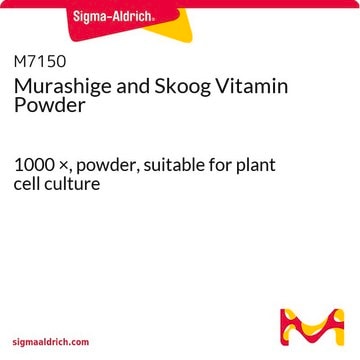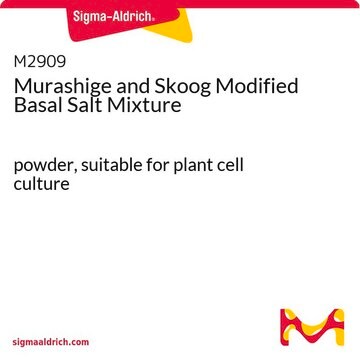M5524
Murashige and Skoog Basal Salt Mixture (MS)
powder, suitable for plant cell culture
Synonym(s):
MS Basal Salts, MS0 Basal Salts, MSO Basal Salts
About This Item
Recommended Products
form
powder
Quality Level
technique(s)
cell culture | plant: suitable
application(s)
agriculture
shipped in
ambient
storage temp.
2-8°C
General description
Application
Formula variant
Quantity
Preparation Note
Other Notes
Powdered media are extremely hygroscopic and must be protected from atmospheric moisture. If possible the entire contents of each package should be used immediately after opening.
Store dry medium in a desiccator at 0-5 °C.
Deterioration of powdered medium may be recognized by: 1) color change; 2) granulation, clumping, or particulate matter throughout the powder; 3) insolubility; 4) pH change; or 5) inability to promote growth when properly used.
Media Preparation
related product
Signal Word
Warning
Hazard Statements
Precautionary Statements
Hazard Classifications
Eye Irrit. 2 - Ox. Sol. 3
Storage Class Code
5.1B - Oxidizing hazardous materials
WGK
WGK 1
Flash Point(F)
Not applicable
Flash Point(C)
Not applicable
Choose from one of the most recent versions:
Certificates of Analysis (COA)
Don't see the Right Version?
If you require a particular version, you can look up a specific certificate by the Lot or Batch number.
Already Own This Product?
Find documentation for the products that you have recently purchased in the Document Library.
Customers Also Viewed
Articles
Classical plant tissue culture media developed years ago by pioneers such as Murashige, Skoog, Gamborg, and others still play a vital role in plant tissue culture research today.
Our team of scientists has experience in all areas of research including Life Science, Material Science, Chemical Synthesis, Chromatography, Analytical and many others.
Contact Technical Service











